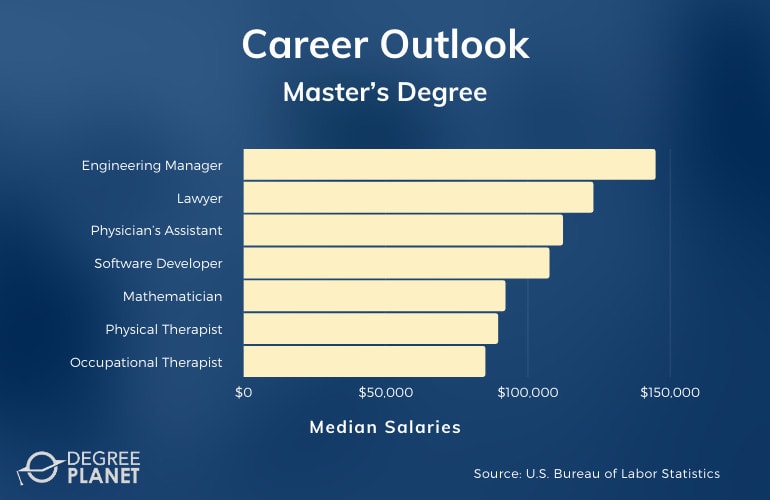Is a master’s degree worth it? A master’s degree may bring with it the prospect of earning promotions, increasing your salary, heightening your job security, networking with ambitious people, and contributing meaningful research to your field.

Editorial Listing ShortCode:
While it requires high-level study and often a significant time commitment, a master’s degree may be highly beneficial to those looking to advance their career, knowledge base, or specialization.
Is a Master’s Degree Worth It?

Yes, a master’s degree is worth it for many students. The Bureau of Labor Statistics is projecting 15% job growth in occupations requiring a master’s degree for entry over the next 10 years, which is much faster than the national average job growth.
Some jobs require master’s degrees as a minimum educational level. Even many business-sector job postings today require an MBA just for consideration. If you’re interested in such a career, then a master’s degree may be worthwhile.
Most fields which offer bachelor’s degrees also offer master’s degrees, with the opportunity to expand your knowledge and skill base further, and advance in your field. Master’s degrees may help open the door to higher-paying positions within many industries, but there are many more benefits than the financial ones.
A master’s degree can help open the door to a more intellectually stimulating and personally gratifying career. Higher job satisfaction may lead to lowered stress, and a better quality of life.
Editorial Listing ShortCode:
Earning a master’s degree may also be a great way to network and meet high achievers in your field. This may mean better career opportunities down the road or the simple joy of conversation with like-minded people.
The work you do for your master’s degree may contribute to research in your field. Even if that doesn’t come with a direct monetary benefit, contributing to your field in that way is an accomplishment in itself.
While some students strive to obtain the highest paying masters degrees, the potential benefits of a master’s degree go well beyond salary. These are some of the many considerations to keep in mind when figuring out whether or not to pursue a master’s degree.
How to Decide Whether a Master’s Degree is Right for You

While earning a master’s degree has many potential benefits, this does not mean that it is the right choice for everyone.
It’s important to weigh your personal goals and circumstances as you consider whether or not to enroll in one of the many traditional or online master’s programs.
1. The job you want requires a master’s degree.
If you want to be a certified registered nurse anesthetist, an occupational therapist, or one of dozens of other jobs, you will generally need at least a master’s degree.
Only you can decide whether or not your desire to work in your dream field is worth the time and money it takes to get a master’s degree. The choice here will be between pursuing the job or settling for another position that fits your current educational level.
2. You want to increase your odds of being promoted.

Your job may require specialized knowledge for advancement. Some promotions require a master’s degree just for baseline consideration, and being great at your job may not be enough to earn you a promotion.
If you are eager to advance in your field but do not have the specialized knowledge required for promotion, a master’s degree is worth considering.
3. You’re hungry to learn more.
Some of us love to learn for the sake of learning. If that’s you, getting your master’s degree may be just what you need to engage your mind.
Master’s degrees generally take the academic “training wheels” off. They may give you the opportunity to do independent research and to intellectually challenge yourself.
4. You want to start a new career.

Maybe you’re burnt out at your current job or just looking for a new challenge. Maybe you’re a little wiser now than when you got your undergraduate degree.
In any case, earning a master’s degree can help you gain the expertise and credentials to help you launch a new career.
5. You are interested in a career in science.
Most jobs in scientific fields require at least a master’s degree.
Editorial Listing ShortCode:
Undergrad degrees in science are great and something to be proud of, but in many cases further studies are needed to gain employment in the field.
6. You want to get a PhD.

Many PhD degree programs require you to have a master’s degree for admission. Even the ones that don’t require it will likely look favorably upon you for having one.
A master’s degree suggests that you’re capable of doing PhD-level research. If any of these describes you, a master’s degree may indeed be right for you.
5 Things You Can Do with a Master’s Degree

Master’s degrees can offer advancement and growth in a number of fields and careers. With a master’s degree, you may earn a job promotion, start a new career, start a PhD program, earn more money, and indulge your love of learning. Or do all of these things!
1. Earn a Job Promotion
Job performance alone isn’t always enough to get promoted. Employers sometimes want you to gain specialized knowledge before taking on a higher position.
This can be especially common with promotions into first-level managerial positions. If you’ve not already supervised people at any level, your boss might want you to have some educational foundation in management before offering you the position.
2. Start a New Career

Earning a master’s degree may be a great launching-off point for embarking on a new career in a different field.
While some master’s degrees will require you to have an undergraduate degree in the same subject, many do not. You may have to take some prerequisites to make up for what your current undergraduate degree didn’t include.
With your new master’s degree, you may be able to transition into the new career you’ve been dreaming about.
3. Start a PhD Program

If you’ve got your eyes set on this high academic credential, you may want to start by earning your master’s degree.
Some PhD programs build master’s degrees into their progression, but generally they’ll want you to already have one. The master’s degree is usually the first step into full-time academic research.
4. Earn More Money

By getting a master’s degree, you may increase your worth to your employer. You may also show them that you are a more competitive candidate for other employers. No one wants to lose good talent.
As a result of this, earning a master’s degree will often result in a higher salary. On average, people with master’s degrees earn $12,000 more in median annual salary than people with bachelor’s degrees alone (Bureau of Labor Statistics).
5. Indulge Your Love of Learning
Maybe you’re one of those people who enjoys learning for its own sake. If so, pursuing your master’s degree may be worthwhile in and of itself.
Editorial Listing ShortCode:
If the hard work and diligent study required of a master’s degree, and the learning that comes from it, appeal to you, then a master’s may be worth considering.
Master’s Degree Alternatives

How long it takes to complete a master’s degree is typically between one to four years, depending on the program. The time and commitment it requires is a big factor to weigh in.
If you have your heart set on a new job or a promotion but can’t afford the expense or time commitment of a master’s degree, there are a few alternatives you might consider.
- Massive Online Open Course (MOOC). MOOCs are pre-recorded courses with no fixed deadlines. More and more of them are offering verifiable certificates of completion. They are becoming increasingly popular, especially in technical subjects like information technology and programming.
- Professional Certificates. You can find these in some universities and in some professional organizations. Professional certificates are streamlined to give you only the most practical information to advance your job.
- Individual Courses. Taking individual courses rather than a full degree program may be appealing to people primarily motivated by a love of learning.
If you’re looking for a promotion, it might be useful to ask your supervisor exactly what he or she wants you to learn. If it’s very specific, an individual course might suffice. Your employer might even reimburse your tuition cost.
No realistic alternatives exist for people looking to start careers in fields that require master’s degrees, but there are alternatives for reaching other objectives.
Master’s Degree Careers & Salaries

According to the Bureau of Labor Statistics, people with master’s degrees earn median annual salaries of $80,340.
Here are just a few of the careers that those with master’s degrees might pursue, along with their median salaries:
| Careers | Annual Median Salaries |
| Engineering Manager | $149,530 |
| Lawyer | $126,930 |
| Physician’s Assistant | $115,390 |
| Mathematician | $110,860 |
| Software Developer | $110,140 |
| Statistician | $92,270 |
| Occupational Therapist | $86,280 |
| Postsecondary Teacher | $80,790 |
| Historian | $63,100 |
| Educational, Guidance, or Career Counselor | $58,120 |
There are, of course, endless other jobs that someone with a master’s degree might pursue. The Bureau of Labor Statistics site is a great resource for tracking down information about these careers.
Is It Easier to Get a Job With a Master’s Degree?

The Bureau of Labor Statistics reports that jobs in master’s levels occupations are projected to grow faster than those in any other education level in the coming years. With an expected growth rate of 15%, they are projected to outpace doctoral and professional-level jobs by 9%. They are also projected to outpace the average of all occupations by 11%.
In other words, it is statistically easier to get a job with a master’s degree. The jobs are also likely to pay better. The Bureau of Labor Statistics reports a median wage of $80,340 for master’s level jobs. The median annual wage for all occupations combined is $41,950.
Getting Your Master’s Degree Online

If you’re looking to make more money, start a new career, or reinvigorate your love of learning, then pursuing a master’s degree may be a great next step for you.
While a master’s degree can be a significant time commitment, pursuing it online can help you earn the credentials you need without quitting your job, relocating, or having to spend too much time away from your family. A growing number of universities even offer quick online masters degree programs, which may allow you to take less time earning your degree.
We sometimes forget how remarkable our modern opportunities are. With the growth of online education, education is more attainable than ever. If you’ve been waiting to pursue a master’s because of time or other constraints, perhaps now is the time to start looking into online master’s programs.

